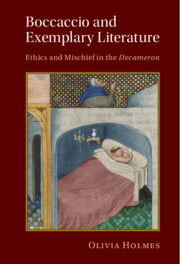Book contents
- Boccaccio and Exemplary Literature
- Cambridge Studies in Medieval Literature
- Boccaccio and Exemplary Literature
- Copyright page
- Epigraph
- Contents
- Acknowledgments
- Introduction
- Chapter 1 Ethical Fables and Antifeminist Exempla
- Chapter 2 From Sermon Story to Novella
- Chapter 3 Lives of Saints; Lives of Sinners
- Chapter 4 Classical and Vernacular Exempla
- Chapter 5 Magister Amoris
- Afterword in Time of Plague
- Notes
- Bibliography
- Index
- Cambridge Studies in Medieval Literature
Afterword in Time of Plague
Published online by Cambridge University Press: 02 February 2023
- Boccaccio and Exemplary Literature
- Cambridge Studies in Medieval Literature
- Boccaccio and Exemplary Literature
- Copyright page
- Epigraph
- Contents
- Acknowledgments
- Introduction
- Chapter 1 Ethical Fables and Antifeminist Exempla
- Chapter 2 From Sermon Story to Novella
- Chapter 3 Lives of Saints; Lives of Sinners
- Chapter 4 Classical and Vernacular Exempla
- Chapter 5 Magister Amoris
- Afterword in Time of Plague
- Notes
- Bibliography
- Index
- Cambridge Studies in Medieval Literature
Summary
I write this in the spring of 2022, after two years spent largely sequestered in my Binghamton home, during which the Decameron has become newly relevant as a piece of our cultural heritage. This is especially true for its opening depiction of the Black Death and people’s diverse, but mostly ineffective responses to it: some playing music and enjoying sophisticated amusements, others pursuing bodily pleasures; some consuming delicate foods and wines in moderation, others drinking to excess. We too have lived through a time when, as Boccaccio puts it, it is acceptable even for the most virtuous to go about “con le brache in capo” if they thought it would save them (Concl. dell’Autore 7). If we learned anything from this crisis early on, it was how to improvise a face-mask from a scarf or bandana – or indeed a bra or a jock strap. That is, that rules and customs (what you wear on your head or your tail) are arbitrary and conventional, and in order to survive, we need to adapt to changing circumstances, to form fresh hypotheses to make sense of new data sets.
- Type
- Chapter
- Information
- Boccaccio and Exemplary LiteratureEthics and Mischief in the <i>Decameron</i>, pp. 196 - 198Publisher: Cambridge University PressPrint publication year: 2023

